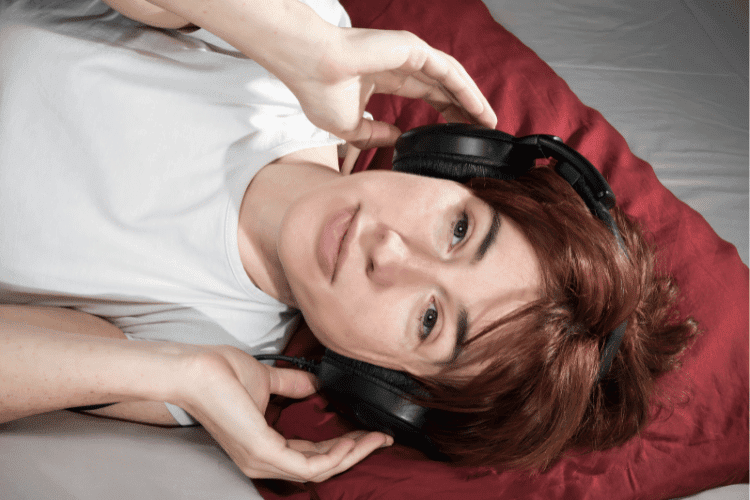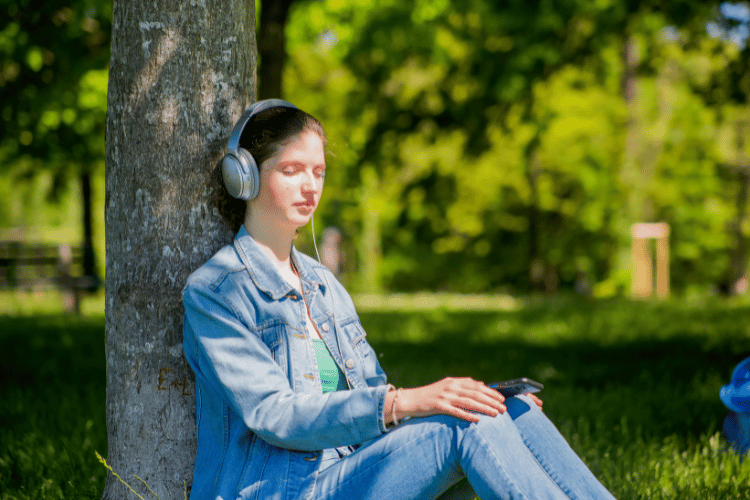When you think about dreams, what’s the first thing that comes to mind? For most people, it’s the odd visuals—the imagery, scenes, or characters. But what about the auditory elements?
Is it rare to hear music in dreams, or do we just not focus enough on the sounds? It turns out that some people can dream about music from time to time, so it’s not exactly rare.
In this article, we’ll explore how common these auditory elements are and what the music might sound like. The article also goes over the possible causes and meanings behind the tunes you keep hearing in your sleep.
Bonus point: We’ll see how dream-based melodies inspired famous artists to create hit tracks!
Some of us never dream of music at all, while others do so frequently. Unfortunately, even avid music dreamers may not remember the notes after waking up.
One scientific review found that the percentage of music dreams in relation to all remembered dreams is 4–8%. An online study had similar results, with a 6% estimate.
After looking around at previous studies and online forums, I think it’s fair to say that the phenomenon is way more common among musicians.
In fact, some reports estimate that musicians dream of music more than twice as much as non-musicians.
Plus, the frequency of dreams with music is related to the age at which the person started their musical instruction. The daily load of the musical activity wasn’t necessarily an important factor, though.

People often think of dreams as a primarily visual experience. Yet when researchers mapped the prevalence and characteristics of 130 dreams, they found auditory elements 93.9% of the time.
However, the most common theme of all the auditory impressions wasn’t music.
Instead, the most prevalent type was hearing other people speaking, which occurred in 83.9% of participants’ dreams. Next on the list was the dreamers themselves speaking, which appeared in 60% of the reports.
Music, along with other types of sounds, made up just 33.1% of the auditory dream reports.
Have you ever heard a sudden, random sound just before drifting away to sleep? Odds are, that was a hypnagogic hallucination, not an actual musical dream.
While many hypnagogic hallucinations are visual in nature, auditory impressions aren’t entirely out of the question.
It’s possible to hear melodic music, phones ringing, doorbells, and so on. This sort of auditory sleep hallucination is reported in 8–34% of all hypnagogia cases.
Overall, these aren’t as intense as musical dreams. The sleep hallucination can be a pleasant surprise or a little startling, depending on the type of music or sound that pops up.
Did you notice how seemingly normal activities like reading or writing are often difficult to perform in dreams?
Well, they are all learned language skills that require effortful focus. So, our dreaming minds may struggle to conjure them. Batman’s “Perchance to Dream” episode covers a similar notion if you’re in the mood for an animated (but not super accurate) explanation!
It’s also worth noting that some people use this phenomenon as a reality check to induce a lucid dream. Trying and failing to read or write often triggers lucidity.
I think a similar principle could apply to playing an instrument. It’s a learned skill that your brain might not be able to simulate as you sleep.
However, there’s another explanation to consider: a 1983 hypothesis from Crick and Mitchison.
The hypothesis proposes that the dream in REM sleep works to remove undesirable connections in the brain. Think of it as a reverse learning mechanism that tackles anything our brain deems non-essential.
Following this theory, it’s not unreasonable to assume that melodies and instruments would be seen as disposable by the dreaming mind of a non-musician.
The mind of a professional musician, on the other hand, will likely view the musical element as essential. As a result, it can bypass the pruning process and enter long-term memory.

Hearing loud music in a dream is mostly described as a positive, enjoyable experience. Yet, the specifics vary from person to person.
Let’s take a look at what people have to say about the sound of music in their dreams.
Music enthusiasts might hear familiar melodies from their daily lives, though with slightly different or imperfect notes. Others experience music that sounds just as realistic as in real life.
This might happen if you like listening to music as you drift away (see also: The 10 Best Albums To Sleep To).
One drawback is that you’ll no longer be able to use music as a reliable reality check while trying to induce a lucid dream.
Quite a few people said they’d hear popular music, and the track would stick in their heads all day.
For others, the music fades quickly from their memories as soon as they wake up.
I haven’t been able to spot a pattern in the genre so far. It seems like pop, jazz, and even rock music are all on the table!
Sometimes, the pleasant music is merely a background aspect.
But in other cases, it’s a major element that the dreamer actively engages with. So, someone might dream of composing or performing a well-crafted song.
Do you know how people say that our brains don’t create faces from scratch, so everyone you dream of is someone you’ve actually seen somewhere?
Similarly, many folks can only hear familiar music that they’ve come across in their waking life.
However, that’s not the only possibility. Some musicians can conjure entirely original music that simply awes them!
They may try humming the melody immediately upon waking to record and recreate it later. Sometimes, the melody ends up being a hit, and we’ll check out some real-life examples in a moment!
Yet, a few people reason that the music only sounds so awesome because the dreaming brain can fool us into thinking its fabricated compositions are flawless masterpieces.

Many renowned musicians throughout history have tapped into their dreams as a source of creative inspiration.
In 1713, Italian violinist Giuseppe Tartini dreamed that he made a pact with the devil, who played him an enchanting violin melody.
Upon waking, Tartini wrote down as much of “The Devil’s Trill” as he could remember. Unfortunately, he said it was pale in comparison to the devil’s playing in the dream.
Centuries later, musicians still find inspiration in their dreams. It’s hard to name them all, but one example that stood out to me was “Enterlude.”
Brandon Flowers of The Killers had a dream of Kurt Cobain singing a melody, which became the basis for the famous song. Interestingly, Flowers recalled that Cobain sounded more like Bob Dylan in the dream!
Meanwhile, John Lennon got the refrain “Ah! böwakawa poussé, poussé” from a dream and used it in the hit “#9 Dream.” Speaking of The Beatles, Paul McCartney said that “Yesterday” came to him in a dream.
So, while not all musicians have a sharp recall to capture inspiration from dreams, those who do can create masterpieces. I’m sure you’ll find even more tales of dream inspiration in a whole lot of genres, from jazz to pop music.
Hearing music in dreams may be a powerful sign that the dreamer has creative potential and needs an outlet in their everyday life.
Another possible interpretation is that the music symbolizes the dreamer’s feelings.
In this case, I’d recommend examining the context and intense emotions evoked by the music to get valuable insights. After all, eerie, creepy music would spark different reactions than a delightful, upbeat melody.
Finally, hearing music in dreams can reflect a passion for music itself. That’s particularly true if music has been part of your professional life for a long period of time!
A dream with music can be an immersive experience that evokes positive emotions, and it’s not likely to have bad effects on your personal life.
While we don’t understand the full reasons behind musical dreams, we have many anecdotal reports of musicians hearing songs in their sleep. We also know that factors like the age of commencement of music education play a role.
Hopefully, future studies will provide more clarity on why some people hear classical music or original tunes in their REM sleep. For now, we can enjoy these auditory gems!
A final word of advice? Before you decide to hear a calming track in hopes of adding musical elements to your dream, read about the risks of sleeping with AirPods in your ear.